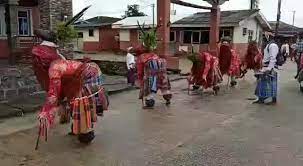Transforming Nigerian Agriculture through Tech EcosystemBy Shuaib S. Agaka
Transforming Nigerian Agriculture through Tech EcosystemBy Shuaib S. Agaka
Culture



By Shuaib S. Agaka
The Director General of National Information Technology Development Agency (NITDA), Kashifu Inuwa has recently highlighted the game-changing potential of emerging technologies like AI, IoT, and blockchain in transforming Nigeria’s agricultural sector.
Mr. Kashifu disclosed this recently during the launching of the Survey on Digitization of Supply-Chain in Small-Scale Nigerian Farms Project, a collaborative effort between AGROVESTO, NITDA, Office for Nigerian Digital Innovation (ONDI), Japan International Cooperation Agency (JICA), and Federal Ministry of Agriculture and Food Security (FMAFS).
The DG, represented by Engr. Salisu Kaka, emphasized that these innovations can revolutionize farming practices, enhance food security, and address long-standing challenges faced by Nigerian farmers.
The initiative aims to harness the power of technology to drive sustainable agricultural growth and improve the livelihoods of small-scale farmers in Nigeria.
Small-scale farming is a vital component of Nigeria’s agricultural landscape, playing a central role in the nation’s economy and food security. This sector is the backbone for millions of rural households, providing employment and sustenance. Small-scale farmers contribute significantly to food production, growing a variety of crops and raising livestock that meet local dietary needs and support domestic markets. Their contributions are crucial for ensuring food availability and stability, especially in regions where large-scale commercial farming is less prevalent.
Despite their importance, small-scale farmers in Nigeria face numerous challenges, that can be easily solved using technological solutions. Even though technological solutions offer overwhelming benefits, however, there are a few problems associated with the adoption of these technological solutions by the farmers, and these call for an address for the growth of the national economy.
One of these arguments is the high initial cost of technological tools. Implementing advanced tools such as precision agriculture systems, data analytics platforms, and automated machinery can require substantial financial investment. For many small-scale farmers, these costs seem huge, especially when budgets are tight and immediate returns on investment are uncertain.
However, it should be highlighted that while the initial costs of digital tools can be significant, it is important to consider the long-term savings and return on investment they offer. Digital technologies can lead to increased efficiency, higher yields, and reduced waste, all of which contribute to greater profitability over time. The improvements in productivity and efficiency can quickly offset the initial expenditure.
Moreover, various funding and support programs are available to help offset the costs of adopting digital technologies. Government grants, subsidies, and low-interest loans are often offered to encourage technological innovation in agriculture. International organizations and non-profits also provide financial assistance and technical support to small-scale farmers. These resources can help ease the financial burden and make the transition to digital tools more feasible.
Another way to mitigate high costs is through collaborative models such as farmer cooperatives. By pooling resources, small-scale farmers can collectively invest in digital tools and share the benefits. This approach not only reduces individual costs but also fosters knowledge sharing and collective problem-solving. Cooperatives can also negotiate better deals and access bulk-purchasing discounts, further lowering the financial impact.
It should be noted that the long-term benefits of digital technologies often outweigh the initial costs. The increased efficiency, reduced waste, and better market access that digital tools provide can lead to substantial economic gains. When viewed as an investment in future productivity and profitability, the initial expense becomes a manageable and worthwhile investment.
Read Also:
Another argument against the adoption of digital technologies in agriculture is that many farmers may struggle to use technologies effectively due to limited technological literacy.
To address technological literacy issues, it is crucial to invest in comprehensive training and support programs. The programs should be tailored to the specific needs of farmers, providing hands-on instruction and practical guidance on using digital tools. Effective training can help farmers build confidence and competence in using new technologies, making the transition smoother and more successful.
Numerous successful digital literacy initiatives provide a model for overcoming this barrier. For instance, organizations like Digital Green and various agricultural extension services have implemented training programs that effectively educate farmers on using technology. These programs often include workshops, field demonstrations, and ongoing support, helping farmers to integrate digital tools into their operations successfully.
Additionally, community-based support networks and peer-to-peer learning can also enhance technological literacy. By fostering a culture of collaboration and knowledge sharing among farmers, these networks can facilitate the exchange of practical tips and troubleshooting advice. Experienced users can mentor others, helping to spread technological proficiency and build confidence across the farming community.
Another concern is that infrastructure challenges, such as limited internet and electricity access in rural areas, are significant barriers to the adoption of digital technologies in agriculture. Many rural regions in Nigeria face unreliable electricity and poor internet connectivity, which can make it difficult for farmers to use digital tools effectively.
Despite these challenges, there have been notable improvements in infrastructure that support digital adoption. Mobile-based applications that function well with lower connectivity levels can offer valuable services even in areas with limited internet access.
Also, solar-powered solutions are also emerging as a practical answer to electricity challenges in rural areas. Solar panels and battery storage systems provide a reliable and sustainable source of power, enabling farmers to use digital tools and technologies regardless of local grid reliability.
Importantly, partnerships between technology providers, government agencies, and local communities can help address infrastructure challenges. Collaborative efforts can lead to the development of tailored solutions that meet the specific needs of rural areas. By working together, stakeholders can create innovative approaches to overcoming infrastructure barriers and supporting digital adoption in agriculture.
To drive the successful integration of digital solutions in Nigerian agriculture, it is imperative that all stakeholders; government agencies, technology providers, and the farming community collaborate and support this transformation. Government agencies should prioritize funding and policy support that fosters technological innovation, such as grants, subsidies, and infrastructure development. By creating favorable conditions for digital adoption, the government can facilitate a smoother transition for farmers. Technology providers, on the other hand, need to focus on developing user-friendly, affordable solutions tailored to the needs of small-scale farmers. Their role also involves providing comprehensive training and support to ensure that farmers can effectively utilize these tools.
Additionally, the farming community must be proactive in embracing digital solutions and participating in training programs. Farmers should engage with available resources and advocate for the tools and support they need to enhance their operations. By building partnerships and sharing knowledge, farmers can collectively advance digital adoption and benefit from improved productivity and market access. Encouraging open dialogue and cooperation among these stakeholders will be crucial for overcoming barriers and realizing the full potential of digital transformation in agriculture.
Shuaib S. Agaka is Tech Journalist and writes from PRNigeria Centre Kano
%%

You must be logged in to post a comment.